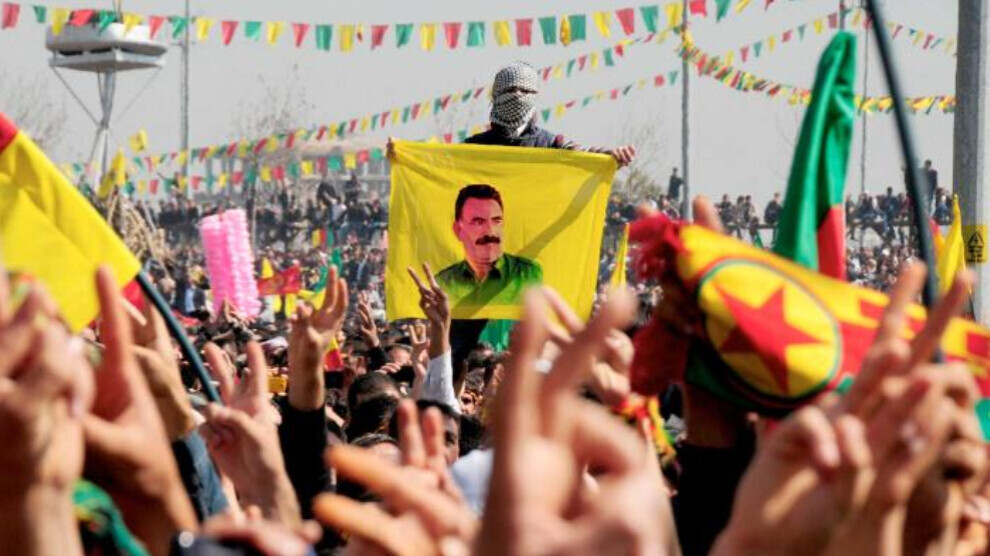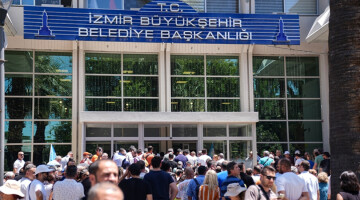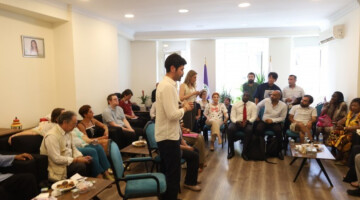The International Initiative “Freedom for Abdullah Ocalan – Peace in Kurdistan” released a statement on the 22nd anniversary of Kurdish leader Abdullah Öcalan’s abduction from Kenya to Turkey on 15 February 1999.
The statement includes the following:
"The outrage about the abduction of Abdullah Öcalan from Nairobi, Kenya, in 1999, was the foundational moment for the International Initiative “Freedom for Abdullah Öcalan —Peace in Kurdistan,” which continues to campaign and to inform the public. With each year, the outrage about Öcalan’s abduction and the demand for his freedom have grown, uniting people across continents.
Twenty-two years after Öcalan was abducted and handed over to Turkey, where he was subsequently sentenced to death in a show trial, one of the people who made it all possible is at the pinnacle of his career: Antony Blinken.
At the time of Öcalan’s abduction, Blinken was special national security advisor to US President Bill Clinton. Although his exact role is unknown, in 2002, he revealed on Turkish television that it was the US that had delivered Öcalan to Turkey. Öcalan and the Kurdish Freedom Movement were clear that his abduction was part of an “international plot,” the purpose of which was to remove an important obstacle to the policy of military interventions in the Middle East by the US and their allies. Today is a good day to take a look at what this plot entailed and what has resulted from it.
The Aftermath of the Abduction
We all know what ensued: a string of invasions and wars that helped further divide the already crisis-ridden societies and pitted the peoples of the Middle East against each other. This culminated in the genocidal attacks of the Islamic State. ISIS was largely a product of these interventionist policies. Thus, this plot was not only directed against Öcalan and the Kurds but against the entire region and its peoples.
Öcalan, on the other hand, time and again warned dangers inherent in this situation and presented suggestions and projects to overcome the national and religious divides and create a new Middle East based on democracy rather than secular or religious nationalism. He called his efforts a project to “foil the international plot.”
Öcalan has been consistently working against this plot, and every year, on 15 February, Kurds around the world remind us that this part of the plot failed. Today, Kurds are leading an effort to gather the peoples in the region together around an inclusive model of self-determination. The results of this are best visible in northeast Syria, a democratically governed area that is a beacon of hope for the wider region.
The USA, on the other hand, has continued on its course toward reshaping the Middle East according to its needs, militarily and through other forms of intervention. Perhaps it is nothing more than a quirk of fate that Antony Blinken, one of the architects of interventionism, whose role can be traced back to the Clinton administration, now has to deal with some of the disastrous results of these interventions.
In the meantime, Öcalan has deepened his project for peace and democracy. With his prison writings and his political interventions, he has become one of the most original and influential thinkers and interlocutors of the twenty-first century. Furthermore, the revolution in Rojava, hugely inspired by Öcalan’s prison writings, has shown the world what the project of the Kurdish Freedom Movement is: peaceful coexistence, resolution of the conflicts between the peoples and nations of the Middle East, and women’s freedom.
Inspiration
The anthropologist David Graeber, one of the great thinkers that we lost in the last year, emphasized this dimension in a text about Öcalan’s quest for truth: “It’s hard to find another theorist of the last fifty years who has taken philosophical and social scientific ideas and adopted them in such a way that he’s been able to inspire millions of people to try to treat one another differently.” (Building Free Life: Dialogues with Öcalan, 2019)
The US, Turkey, Russia, Israel, the EU—they all wanted to silence Öcalan. They did not succeed. Human Rights institutions like the Council of Europe and Amnesty International were complicit in this. They were only concerned about the death penalty, and they did not even succeed in getting it properly lifted. The death penalty was simply replaced by an “aggravated life sentence,” which is meant to ensure Öcalan is held incommunicado “until death” in an island prison. Still, they did not succeed. The peoples of the Middle East were not pitted against each other, at least not as the consequence of Öcalan’s abduction. Öcalan’s prison writings are out and, as David Graeber rightly commented, continue to inspire millions. As great a spirit as Öcalan’s cannot be confined by prison walls.
The Role of the CPT
The Committee for the Prevention of Torture (CPT) has frequently visited İmralı Island and has made numerous recommendations, which are routinely ignored by the Turkish authorities. Nonetheless, by continuing its so-called “dialogue” with the Turkish state, the CPT provides a veneer of legitimacy to the ongoing violations of the basic human rights of the prisoners at İmralı Island. Although the CPT has proven unable to improve the situation, which it correctly denounces as unacceptable, the rest of the Council or Europe can constantly refer to how the CPT is dealing with it. This, in turn, provides an excuse for not tackling the situation in any other way.
This is why, after only one year, other political prisoners and activists have once again started hunger strikes. For almost three months now, there have been rotating hunger strikes in Turkish prisons and elsewhere to protest Öcalan’s isolation and demand his freedom. At the same time, there have been numerous demonstrations around the world as part of the ongoing campaign “The Time Has Come: Freedom for Öcalan!”
Antony Blinken recently said that he has done “a lot of hard thinking” about past decisions on countries like Syria. We have yet to see the result of his thinking. Will the US and NATO stop supporting genocidal attacks by Turkey and respect the choice of the women and peoples of the Middle East—Öcalan’s democratic confederalism?
Öcalan and his freedom are indispensable for peace and democracy in the Middle East. Those who openly or covertly support the Turkish war efforts, shut Öcalan out, or deliberately ignore the atrocious conditions he is held in are directly opposing peace. It is as simple as that. We call on everybody to join us in our struggle for freedom for Abdullah Öcalan, as his freedom would be the harbinger of peace in Kurdistan and the Middle East.”













